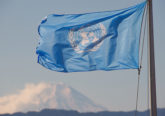
Iver Neumann, an authoritative researcher of Russian affairs, claimed in his central work ‘Russia and the idea of Europe: a study in identity and international relations’, that Europe has always been an important ‘Other’ when it comes to how Russia constructs and sustains its identity. Whilst this still seems to be the case, it could be argued that Europe is only one Other in the story of Russia’s constant invention and reinvention of its own identity. After World War II, Russia’s favourite choice of Other became split. Europe became (and remains) the preferred Other in relation to Russia’s view of its internal organisation – state, society, and culture. However, the United States has taken the prime position in relation to Russia’s identity as an international actor.
One of the most indicative examples of Russian relational identity construction is the reaction to the recent assassination of Osama Bin Laden by US commandos. This has been used by one of the most popular Russian theatre and TV actors, Mikhail Efremov, to suggest Russian political superiority over the US. The actor recently performed a poetry-reading based on parodies of famous Soviet verses. After reports about the death of the Al Qaeda leader, Efremov used a famous epic song by the highly popular Soviet bard Vladimir Vysotsky to comment on the story. The choice of the song is an eloquent one: ‘He did not return from the battle yesterday…’ The song by Vysotsky – about a simple Soviet soldier who did not return from battle with the Nazis – remains one of the most popular musical narrations about WWII in Soviet popular culture.
In his performance, Efremov presents Bin Laden as the hero, paying him a certain degree of respect. Efremov denies any sympathy for Bin Laden. But, nevertheless, the very phrase ‘he did not return from fighting yesterday’ undermines the representation of Bin Laden as a terrorist and constructs an image of him as an enemy who deserves respect. Efremov concedes that Osama was a threat to the entire world, but he presents reasons why he regrets his death:
True, he did not give a crap to the laws and people,
he was trafficking arms and people,
But to tell the truth, I personally regret somehow,
Because that was Obama, who got him…
The regret relates to the glory appropriated by a ‘yappy’ American president, watching the murder of his enemy from a comfortable office in the White House. The rhetorical question that Efremov addresses to the United States is that, if you are a superior nation, why did you not take him to the Hague International Tribunal? Or even follow the model of the Russian courts when the Kremlin used to present its enemies with a pre-decided verdict?
In the following lines, Efremov constructs an image of Russian superiority by stating that Moscow conducts its own fight against terrorism. And he suggests that, unlike the US fight, this fight is not only a reality show, ‘it is more genuinely real’. Efremov states that Russians can go to the ground and chase their enemies for several years and eventually even ‘kill’ them several times. Here he refers to the fact that many of the terrorists in the North Caucasus, who have been reported dead or captured, eventually escaped Russian attack and have carried out retaliation strikes against Russia. A Western observer may perceive this as recognition of the low effectiveness of Russian law-enforcement agencies, but in the view that Efremov expresses Russia is a more benevolent power than the US, because Russia’s enemies have committed so many crimes, spilt so much Russian blood and escaped so many times from an honest fight, and this makes them more dangerous, more inhumane and less respectable enemy. The Russian fight against terrorism is therefore constructed in more existential terms – Russia was forced to kill these terrorists, otherwise it would be destroyed – and, thus, is more justified than a cold-blooded hunting down of Bin Laden by US commandos. The superiority of Russia is therefore due to the extreme conditions in which it has had to wage its own war against terror.
In the three final strophes, Efremov draws comparisons between how the US has dealt with Bin Laden and how Russia has dealt with one of her main terrorists, Ramzan Kadyrov, who eventually surrendered and became part of the peace-making process in Chechnya. He became reconciled with the Kremlin and even went on to become Chechen President, with the Kremlin’s support. Over the past four years, he has become one of the most high-profile figures in Russia. He has been repeatedly decorated, including the top order of ‘Hero of Russia’. A frequent visitor to the Kremlin, and host and guest to various sports and social events, Kadyrov has managed to transform his image from a former radical Islamist terrorist, who fought against Russia, into a moderate Moslem leader and loyal border-guard of the Russian Federation. Using Kadyrov’s evolution as an example, Efremov asks a rhetorical question: ‘Can you imagine how much (Bin Laden) would like it if he attended the White House for a lunch or if he had interviews with Paris Hilton?’
Although Efremov shows a great deal of scepticism and criticism to the current Russian leadership in his performance, he still stands by the idea of the superiority of Russian anti-terrorist policies over the US war against terror, based on the belief that Russia can defeat terrorists and then forgive them, and offer to ‘finish this war in a draw’. The assumption is that Washington could also defeat and disarm Bin Laden through humanitarianism and reconciliation, and without the need of wars and warlike gestures. According to Efremov, the fact that Washington chose to hunt down and kill Bin Laden is an incompetent and emotional move, because these US anti-terrorist policies have now created the image of Osama as a hero-enemy who ‘did not return from the battle’, whereas Russia has re-educated Kadyrov, its own Bin Laden, through rehabilitation and recovery work in Chechnya.
Whether one might agree or disagree with the arguments used by Mikhail Efremov, his parody suggests that Russia still considers the United States to be an important Other (to use Neumann’s phrase) for Russia to be compared with and defined against. The fact that a mainstream actor might use the death of Osama Bin Laden to draw a critical comparison between US and Russian foreign policies indicates how much the United States is still a major reference point when Russians seek to define their international political identity.
Vsevolod Samokhvalov is a doctoral candidate in International Studies at the University of Cambridge.






No Comment